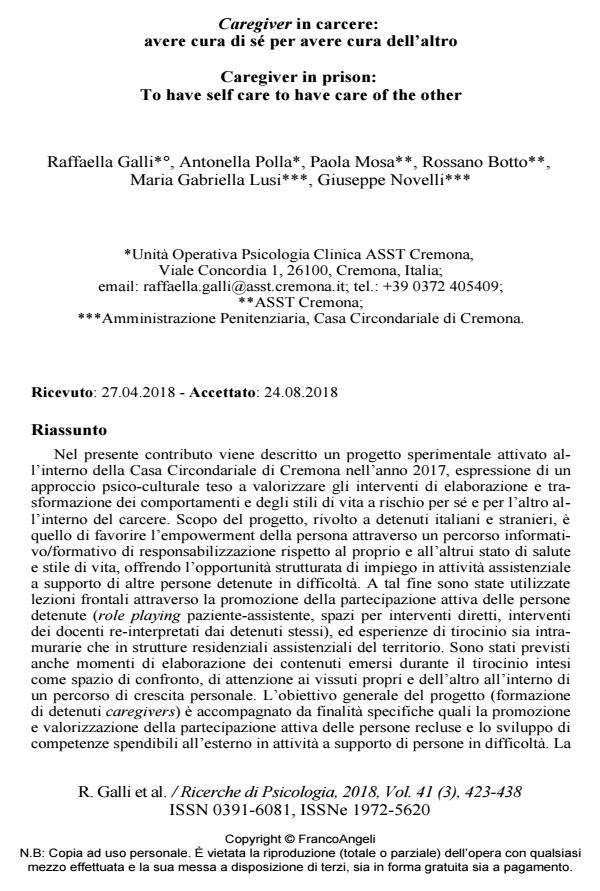Caregiver in prison: To have self care to have care of the other
Journal title RICERCHE DI PSICOLOGIA
Author/s Raffaella Galli, Antonella Polla, Paola Mosa, Rossano Botto, Maria Gabriella Lusi, Giuseppe Novelli
Publishing Year 2018 Issue 2018/3
Language Italian Pages 16 P. 423-438 File size 58 KB
DOI 10.3280/RIP2018-003007
DOI is like a bar code for intellectual property: to have more infomation
click here
Below, you can see the article first page
If you want to buy this article in PDF format, you can do it, following the instructions to buy download credits

FrancoAngeli is member of Publishers International Linking Association, Inc (PILA), a not-for-profit association which run the CrossRef service enabling links to and from online scholarly content.
The present paper describes an experimental project activated within the Cremona District Prison in 2017, expression of a psycho-cultural approach aimed at enhancing the processing and transformation of behaviors and lifestyles at risk for oneself and for the other inside the prison. The aim of the project, aimed at Italian and foreign prisoners, is to foster the empowerment of the person through an educational/ training path of responsibility with respect to their own and to the other state of health and lifestyle, offering the structured opportunity of employment in assistance activities to support other persons in difficulty. To this end, frontal lectures were used through the promotion of the active participation of the detainees (role playing-patient assistant), spaces for direct interventions, interventions of the teachers re-interpreted by the prisoners themselves, and internship experiences both intra muros and in residential care services structures in the territory. There have also been some moments of re-elaboration of the contents, emerged during the internship, intended as a space for comparison and attention to one’s own experiences and the others within a process of personal growth. The general objective of the project (education and training of caregivers detained) is accompanied by specific aims such as the promotion and enhancement of the active participation of people held in prison and the development of skills that can be spent outside in activities to support people in difficulty. The psychological value of this project (soon replicable within the Cremona Institute) is helping the detained person to develop active processes of Self-awareness (resources and limits) and of the Other through the acquisition of new skills aimed at building a better-defined role identity.
Keywords: Caregiver, help relationship, self and other, prevention, penitentiary context.
- Envisioning the future: A neuropsycho-pedagogical intervention on resilience predictors among inmates during the pandemic Tania Di Giuseppe, Giulia Perasso, Claudio Mazzeo, Alessandro Maculan, Francesca Vianello, Patrizio Paoletti, in RICERCHE DI PSICOLOGIA 3/2023 pp.1
DOI: 10.3280/rip2022oa14724
Raffaella Galli, Antonella Polla, Paola Mosa, Rossano Botto, Maria Gabriella Lusi, Giuseppe Novelli, Caregiver in carcere: avere cura di sé per avere cura dell’altro in "RICERCHE DI PSICOLOGIA " 3/2018, pp 423-438, DOI: 10.3280/RIP2018-003007